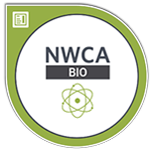PURPOSE
The Biology Essentials credential documents the essential competencies for professionals who need a foundational understanding of basic biology concepts including basic chemistry concepts for biology, plant and animal cellular structure and physiology, plant and animal evolution, and ecological concepts.
AUDIENCE
This credential is appropriate for an array of professions including forensic scientist technicians, agriculture and food science technicians, anthropology and archaeology field workers and assistants, biological technicians, conservation scientists and forestry technicians, geological technicians, zoologists, wildlife biologists, animal caretakers, environmental science and protection technicians, secondary science teachers, veterinary technicians, natural scientists, medical science technicians, allied health technicians, and students in natural science or pre-health programs.
JOB/CAREER REQUIREMENTS
The credentials in Biology Essentials demonstrate earners' general understanding of biochemistry and general chemistry, the scientific method, a general understanding of DNA makeup and replication, conservation, evolution, ecosystems, and ecological communities. Job requirements span a wide continuum depending upon the specific position and industry. Many entry-level positions require minimum education and training while other positions require baccalaureate and graduate degrees and extensive training and on-the-job experience.
BIOLOGY WORKPLACE TASKS:
- Lead meetings with scientists, engineers, or others to plan or review projects or to provide technical assistance.
- Develop client relationships and communicate with clients to explain proposals, present research findings, establish specifications, or discuss project status.
- Plan or direct research, development, or production activities.
- Review project activities and prepare and review research, testing, or operational reports.
- Establish scientific or technical goals within outlines provided by management and create detailed plans to accomplish these goals.
- Establish or implement policies, standards, or procedures for the scientific or technical work performed.
- Create or coordinate phases of problem analysis, solution proposals, or testing.
- Communicate research results through presentations, scientific publications, or project reports.
- Prepare project proposals.
EXAM STRUCTURE OVERVIEW
Number of Questions in Exam: 100
Total Time: 90 minutes
Overall Passing Score: 70%
(All sections require an individual passing score of 70%)

